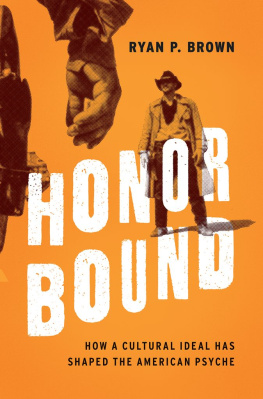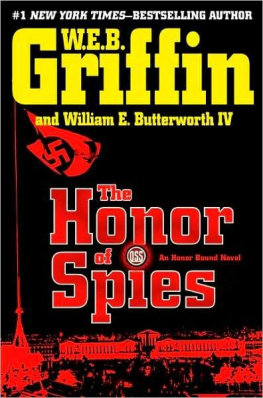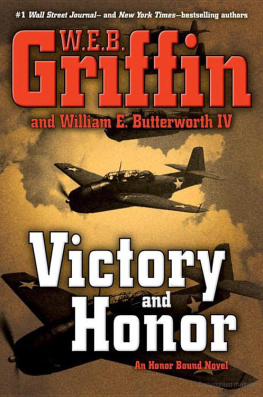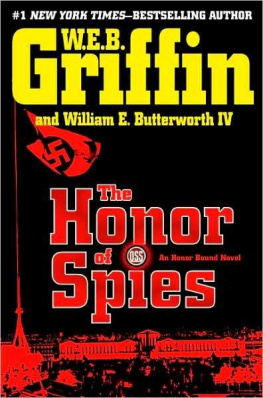Griffin W.E.B. - Honor Bound 03 - Secret Honor
Here you can read online Griffin W.E.B. - Honor Bound 03 - Secret Honor full text of the book (entire story) in english for free. Download pdf and epub, get meaning, cover and reviews about this ebook. year: 1999, genre: History. Description of the work, (preface) as well as reviews are available. Best literature library LitArk.com created for fans of good reading and offers a wide selection of genres:
Romance novel
Science fiction
Adventure
Detective
Science
History
Home and family
Prose
Art
Politics
Computer
Non-fiction
Religion
Business
Children
Humor
Choose a favorite category and find really read worthwhile books. Enjoy immersion in the world of imagination, feel the emotions of the characters or learn something new for yourself, make an fascinating discovery.

- Book:Honor Bound 03 - Secret Honor
- Author:
- Genre:
- Year:1999
- Rating:3 / 5
- Favourites:Add to favourites
- Your mark:
- 60
- 1
- 2
- 3
- 4
- 5
Honor Bound 03 - Secret Honor: summary, description and annotation
We offer to read an annotation, description, summary or preface (depends on what the author of the book "Honor Bound 03 - Secret Honor" wrote himself). If you haven't found the necessary information about the book — write in the comments, we will try to find it.
Honor Bound 03 - Secret Honor — read online for free the complete book (whole text) full work
Below is the text of the book, divided by pages. System saving the place of the last page read, allows you to conveniently read the book "Honor Bound 03 - Secret Honor" online for free, without having to search again every time where you left off. Put a bookmark, and you can go to the page where you finished reading at any time.
Font size:
Interval:
Bookmark:
SECRET HONOR
HEADQUARTERS
CLASSIFICATION: MOST URGENT
TRANSPORT AND STORE THE SPECIAL CARGO
AND THEIR DEDICATION TO THE PRINCI PLES OF NATIONAL SOCIALISM AND THE
THE JOINT CHIEFS OF STAFF
II
CLASSIFICATION: MOST URGENT
ARGENTINE GOVERNMENT WOULD HAVE MADE
FAMILIAR WITH THE INCIDENT.
SECRET
0600 SURVEILLANCE TERMINATED
1623 ARENALES
IV
Schloss Wachtstein
17."
BACARDI AT FIRST OPPORTUNITY WILL
VI
VII
She poured herself a cup of coffee.
PRIORITY
VIII
THE SITUATION IS BEING EVALUATED AT
FREIHERR VON WACHTSTEIN AND
TERNICH. KORVETTENKAPITAN KARL BOLTITZ,
IX
GENERALMAJOR MANFRED VON DEITZBERG
THE FUHRER'S HEADQUARTERS 30
HIM AS AN OLDER BROTHER-TO EXPRESS
XI
"OK."
"OK."
XII
OK?"
URGENT
XIII
1943
Or was it Baron Hans-Peter von Wachtstein, the Graf-to- i
XVI
ENGINE START."
XVII
XVIII
CLASSIFICATION: MOST URGENT
BOTH LUTZEN AND DEITZ, WITHOUT PRIOR
CONSIDERS TO HAVE 'BEEN HIS BEST
WHO IS BELIEVED TO BE AN AGENT OF
OF OBERST GRUNER AND STANDARTEN FUHRER GOLTZ. IN THIS CONNECTION,
REGRETS THE UNFORTUNATE DEATH OF
THE UNDERSIGNED PARTCIPATED IN THE
XIX
"OK."
LEFT ENGINE START."
Canaris
"OK."
SECRET HONOR
W.E.B.
GRIFFIN
Prologue
During the spring of 1943, 240 German submarines were operating in the North and South Atlantic Ocean. Their mission was the interdiction of Allied shipping carrying war supplies from the United States to England and North
Africa, and of Allied shipping carrying wool, beef, and other foodstuffs from (primarily) Argentina to England. During that month German submarines sank fifty-six Allied ships, totaling 327,900 tons, at a cost of fifteen submarines sunk, most of them in the North Atlantic.
German submarines operating in the North Atlantic- often in groups called "Wolf Packs"-operated out of Euro pean ports and returned to them for replenishment.
German submarines assigned to the South Atlantic
Ocean, however, were faced with the problems of the great distances between their European home ports and their operational areas. It took approximately a month for a submarine sailing from a French port to reach the mouth of the River Plate in Argentina. Once there, it had little fresh food or fuel-often barely enough to return to its home port. Once its torpedoes were expended, there was no resupply closer than France.
In the months before April 1943, the Germans tried to solve the problem in various ways. At first they dispatched replenishment ships-often flying the neutral flags of Spain or
Portugal-to the South Atlantic. The Americans countered by furnishing specially modified (smaller bomb load, more fuel capacity) B-24 aircraft to Brazil, which had declared war on the Axis in January 1942. These aircraft kept the South Atlantic coast off Argentina and Uruguay under surveillance. Any ship caught replenishing German submarines was considered a legitimate target under the
Rules of Warfare, no matter what flag the ship was flying.
The next German tactic was to anchor "neutral" merchant ships close to the Argentine shore in the River Plate. The
Plate is 125 miles wide at its mouth, and is shared by
Argentina and Uruguay. The government of Argentina, then led by pro-Axis president General Ramon Castillo, looked the other way.
It was politically impossible either to bomb ships flying the flags of nonbelligerent powers anchored in neutral waters, or to stop and search suspected vessels of neutral powers on the high seas.
April 1943 was a busy month in a world at war: On 3 April,
General George S. Patton launched an attack against the
Germans near El Guettar, Tunisia; and two days later, British general Bernard Montgomery attacked the Italians on the Wadi
Akarit line.
On 7 April, the Japanese sent 180 aircraft to attack the
Americans on Guadalcanal and Tulagi in the Solomon
Islands. A United States destroyer and two cargo vessels were sunk.
The same day, Adolf Hitler met with Benito Mussolini in
Salzburg, Austria. They decided that Africa had to be held at all costs.
[ONE]
Near Sidi Mansour, Tunisia
1530 7 April 1943
A solitary Afrika Korps staff car-a small Mercedes convertible sedan-moved as quickly as it could across the desert. It had of course been painted in the Afrika Korps desert scheme: tan paint mimicked the color of the Tunisian desert, and crooked black lines on the hood and doors were intended to break up the form of the vehicle and make it harder to spot at a distance.
Nothing could be done, however, to keep the dust of the
Tunisian desert road from boiling up beneath the wheels of the
Mercedes and raising a cloud scores of feet into the air. If anyone was looking, the dust cloud formed an arrow pointing to the Mercedes.
And someone was looking-an American pilot in a P-51
Mustang.
The North American P51-C and -D aircraft used in the North
African campaign were powered by a Packard version of the
British Merlin engine. They had a top speed of 440 knots, and were armed with four.50-caliber Browning machine guns.
Hardpoints in the wings permitted the use of droppable auxiliary fuel tanks and could also be used to carry 1,000 pound bombs.
Even at 500 feet and an indicated airspeed of 325 knots, it hadn't been hard for Captain Archer C. Dooley, Jr., U.S. Army
Air Corps, to spot the boiling dust and then the Afrika Korps staff car that had caused it.
"Oh, shit!" Captain Archer Dooley, Jr., said sadly.
Finding a Kraut staff car running unprotected across the desert did not please him. When young Archie Dooley first signed up to fly fighter aircraft, he expected to become a
"Knight of the Sky"-flying mano a mono against other knights of the sky. He didn't expect to be killing people like cockroaches.
Fifteen months before, Archie Dooley had been the valedicto rian of the 1942 class at St. Ignatius High School in Kansas
City, Kansas. Six weeks before, he had been Second Lieutenant
Dooley. He had come to Tunisia fresh from fighter school, looking forward to sweeping Nazi Messerschmitts from the skies with the four.50-caliber Brownings in the wings of his
Mustang, much as Errol Flynn had swept the Dirty Hun from the skies over France in World War I in Dawn Patrol.
After which, with a little bit of luck, there would be a girl in the Officers' Club with an exciting French accent, long legs, long hair, and firm breasts, who would express her admiration for a Knight of the Sky in a carnal fashion.
It hadn't turned out that way.
For one thing, by the time Archie got to the squadron, the
Allies had attained air superiority over the enemy. In other words, no German or Italian aircraft were left to be swept from the skies.
The day Archie reported in, the squadron commander had informed him that the 23rd Fighter Group had ordered the squadron to be engaged in ground support. That broke down into two missions: The first was to attack the enemy in front of
American infantry and armor with either wing-mounted bombs or the.50-caliber Brownings. The second was recon naissance and interdiction. This meant flying over enemy held desert to see what you could see, and to interdict- which meant to shoot up-anything you found.
Second Lieutenant Archer Dooley, Jr.'s first mission had been to fly wingman to the squadron commander on a two plane reconnaissance and interdiction mission. At first, that had been sort of exciting even fun.
They had raced across the desert close to the ground at better than 300 knots, a maneuver flatly forbidden in flight school. Here it was perfectly acceptable.
Next pageFont size:
Interval:
Bookmark:
Similar books «Honor Bound 03 - Secret Honor»
Look at similar books to Honor Bound 03 - Secret Honor. We have selected literature similar in name and meaning in the hope of providing readers with more options to find new, interesting, not yet read works.
Discussion, reviews of the book Honor Bound 03 - Secret Honor and just readers' own opinions. Leave your comments, write what you think about the work, its meaning or the main characters. Specify what exactly you liked and what you didn't like, and why you think so.





